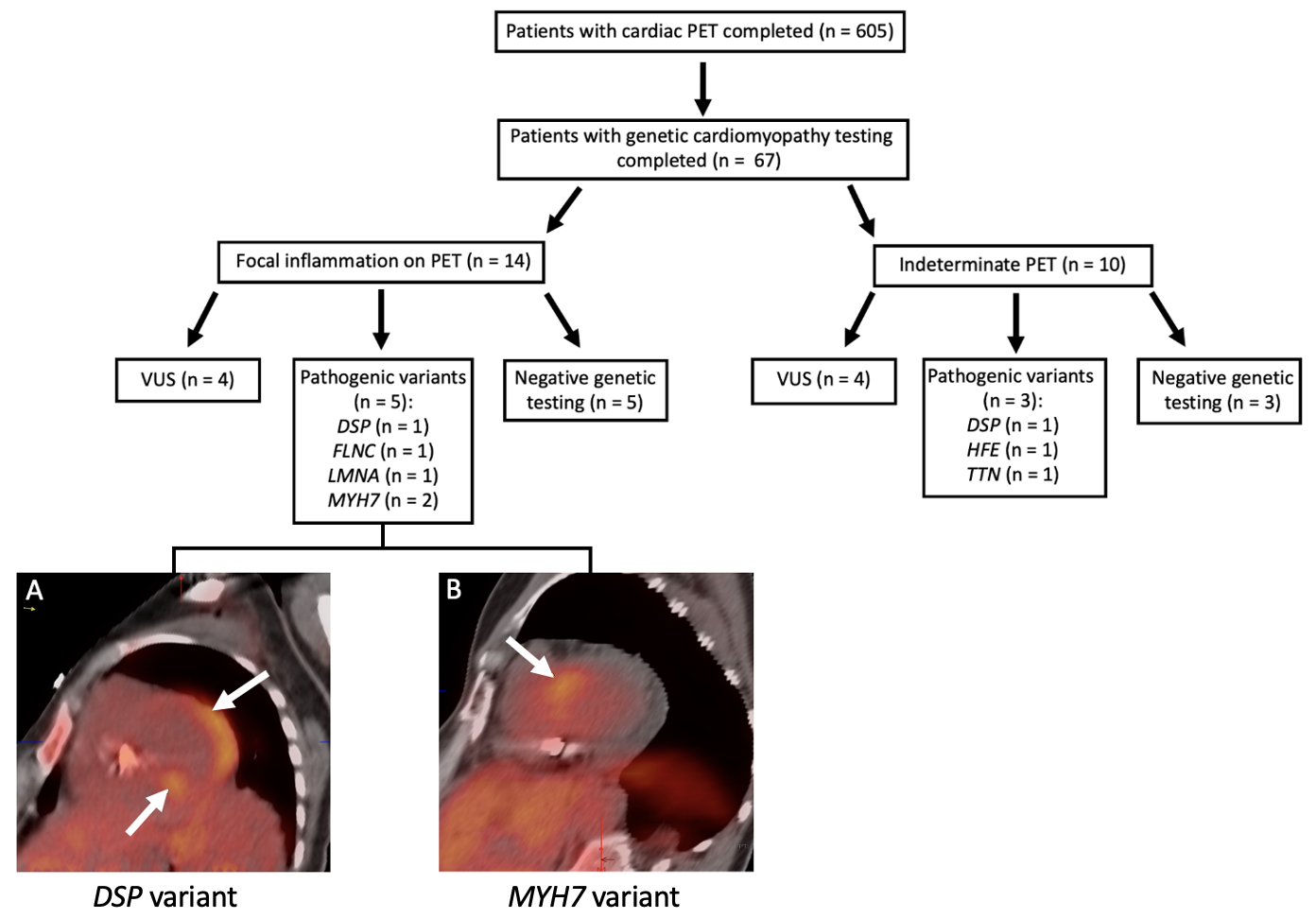Final ID: Su4149
Determining the Prevalence of Genetic Cardiomyopathies in Non-Ischemic Cardiomyopathy Patients Undergoing Cardiac Positron Emission Tomography-Computed Tomography: A Single Institution Experience
Abstract Body (Do not enter title and authors here): Introduction: Inflammatory cardiomyopathies such as sarcoidosis are associated with increased focal 18F-FDG uptake on cardiac positron emission tomography-computed tomography (PET-CT). It has been reported that patients with genetic cardiomyopathies with desmosomal mutations may also have abnormal cardiac PET scans. The incidence and type of genetic cardiomyopathies with abnormal cardiac PET imaging remains unclear.
Objective: To determine the prevalence of genetic cardiomyopathies in patients with abnormal cardiac PET imaging.
Methods: Data from patients who underwent cardiac PET imaging at our institution between 2018-2024 were analyzed. Those who completed genetic testing were further identified and evaluated for mutation variant type and imaging findings.
Results: Of 605 patients with non-ischemic cardiomyopathy referred for cardiac PET scans, 67 (11%, mean age 51.8 ± 15.4 years, 69% male, mean LVEF 46.5 ± 15.1%) had undergone genetic testing. Of these, 21% (n = 14) had evidence of focal inflammation and 15% (n = 10) had indeterminate PET results with assessment of focal inflammatory findings limited by incomplete suppression of physiologic metabolism at the time of imaging. Of patients with focal inflammation, 36% (n = 5) tested positive for known pathogenic gene variants: DSP (n =1), FLNC (n = 1), LMNA (n = 1), and MYH7 (n = 2). An additional 4 patients with evidence of focal inflammation had variants of uncertain significance (VUS). Among the 10 patients with indeterminate cardiac PET findings, 3 had pathogenic mutations: DSP (n = 1), HFE (n = 1), and TTN (n = 1). There was no difference in the cardiac PET imaging findings of patients with versus without genetic cardiomyopathies with regard to focality or location of FDG uptake.
Conclusion: Pathogenic mutations beyond desmosomal gene variants can present with evidence of inflammation on cardiac PET. Genetic testing amongst non-ischemic cardiomyopathy patients with abnormal cardiac PET scans should be considered to evaluate for other etiologies beyond sarcoidosis.
Objective: To determine the prevalence of genetic cardiomyopathies in patients with abnormal cardiac PET imaging.
Methods: Data from patients who underwent cardiac PET imaging at our institution between 2018-2024 were analyzed. Those who completed genetic testing were further identified and evaluated for mutation variant type and imaging findings.
Results: Of 605 patients with non-ischemic cardiomyopathy referred for cardiac PET scans, 67 (11%, mean age 51.8 ± 15.4 years, 69% male, mean LVEF 46.5 ± 15.1%) had undergone genetic testing. Of these, 21% (n = 14) had evidence of focal inflammation and 15% (n = 10) had indeterminate PET results with assessment of focal inflammatory findings limited by incomplete suppression of physiologic metabolism at the time of imaging. Of patients with focal inflammation, 36% (n = 5) tested positive for known pathogenic gene variants: DSP (n =1), FLNC (n = 1), LMNA (n = 1), and MYH7 (n = 2). An additional 4 patients with evidence of focal inflammation had variants of uncertain significance (VUS). Among the 10 patients with indeterminate cardiac PET findings, 3 had pathogenic mutations: DSP (n = 1), HFE (n = 1), and TTN (n = 1). There was no difference in the cardiac PET imaging findings of patients with versus without genetic cardiomyopathies with regard to focality or location of FDG uptake.
Conclusion: Pathogenic mutations beyond desmosomal gene variants can present with evidence of inflammation on cardiac PET. Genetic testing amongst non-ischemic cardiomyopathy patients with abnormal cardiac PET scans should be considered to evaluate for other etiologies beyond sarcoidosis.
More abstracts on this topic:
Device Therapy in Cardiac Sarcoidosis: A Comparative Analysis of ICD and PPM on Mortality, Hospitalization, and Incident Heart Failure
Gupta Kunal, Abdi Nawal, Sharma Esseim
A Case of Concomitant Wild-Type Transthyretin and Systemic Light Chain Amyloidosis Involving Separate OrgansChiu Leonard, Afrough Aimaz, Nadeem Urooba, Jebakumar Deborah, Grodin Justin

